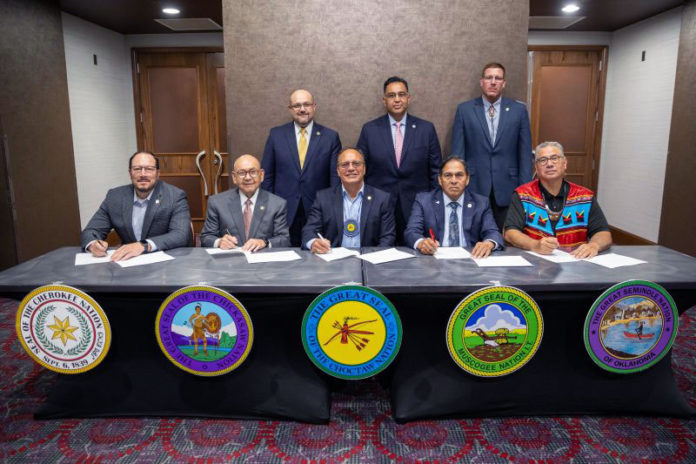
TULSA, OK – Tribal members and citizens of the Cherokee Nation, Chickasaw Nation, Choctaw Nation of Oklahoma, Muscogee Nation and very soon Seminole Nation can utilize their tribal membership to enjoy hunting and fishing in participating tribes’ treaty territories.
The Inter-Tribal Council of the Five Civilized Tribes announced the Five Tribe Wildlife Management Reciprocity Agreement at its July quarterly meeting at the Hard Rock Hotel & Casino Tulsa on July 12, allowing hunting and fishing licenses issued through each tribe to be recognized by the other tribes that are party to the agreement, on respective reservation land. Most tribes allow for their tribal membership cards to serve as their credential or license.
All Oklahoma residents with valid state-issued hunting and fishing licenses are eligible to hunt and fish within these tribal treaty territories in accordance with all applicable laws. Hunting and fishing licenses were made available to tribal members and citizens in October 2022. The agreement will allow the Five Tribes to collaborate on wildlife management within their reservations and enhance their ability to effectively manage natural resources in a sustainable manner.
The agreement states hunting and fishing activities by tribal members and citizens under this agreement will be subject to the laws of the tribe on whose reservation the activity is taking place. It is the responsibility of the individuals engaging in these activities in the various reservations to know and abide by any applicable laws. Tribal citizens will also be responsible for securing permissions to access land owned by others to engage in hunting and fishing, though each tribe will manage programs to provide access to tribally-owned areas.
Tribal citizens or members reporting harvests will report this to the tribe to which they are a citizen or member. Hunting and fishing limits are considered aggregate statewide, and limits do not reset in or outside each reservation. Each tribe will report basic harvest data each year by Feb. 28 to help regulate and manage wildlife.
State game wardens cross-deputized with the respective tribes can ticket and enforce laws on these reservations, as well. The tribes indicated that they look forward to working with state and federal partners as they implement this agreement and continue to identify partnerships for advancing wildlife conservation.
“Hunting and fishing are inherent treaty rights among our five tribal nations and have been vital to food security for generations of Cherokees,” said Cherokee Nation Principal Chief Chuck Hoskin Jr. “As Cherokees, we can use tribal citizenship photo IDs to hunt and fish on our 7,000 sq. mi. reservation. For the past two years, this has proven to be a highly successful initiative for both the tribe and our outdoor sportsmen. This new Five Tribes agreement makes hunting and fishing in eastern Oklahoma more sustainable and more diverse for all our citizens. The adoption of uniform codes by all tribal governments involved is a significant accomplishment and demonstrates the strength of our collective sovereignty.”
“We have established the Choctaw Nation Wildlife Conservation Department to assert our tribal sovereignty,” said Choctaw Nation Chief Gary Batton. “This department determines how our citizens hunt and fish on our reservation by using their tribal membership. We have now taken a significant step forward by partnering with the Inter-Tribal Council. This partnership will provide further opportunities for our tribal members to hunt and fish on our reservations using their tribal membership. Together, we are asserting our tribal sovereignty and benefiting approximately 815,000 tribal citizens, as well as all Oklahomans.”
“Since time immemorial, our people have been the original environmentalists, looking to the land for sustenance and abundant life,” said Muscogee Nation Principal Chief David Hill. “I’m proud of this new agreement with the Five Tribes, as it not only shows a strengthening of our sovereign rights to hunt and fish on these lands, but gives us greater autonomy over the care and preservation of them for generations that follow. It’s a special gift to our citizens, many of them outdoorsmen, who have dreamed of a day that they could register their harvests under the flag and authority of their own Nation. That day is now, and we couldn’t be happier.”
“Before recorded history, Chickasaw people engaged in sustainable management of natural resources and wildlife, as did our First American neighbors, as a means to sustain our families throughout the seasons,” said Chickasaw Nation Governor Bill Anoatubby. “Just as we now work to preserve our history and culture, we are also stewards of our natural resources and wildlife. For this reason, we are pleased to commit to the careful management of fish and wildlife by partnering with the Inter-Tribal Council for this agreement. This will enhance our efforts to effectively manage our wildlife conservation efforts, in accordance with all applicable laws, as it expands opportunities for sportsmen throughout the participating tribal territories.”













































